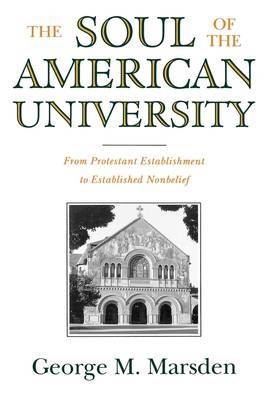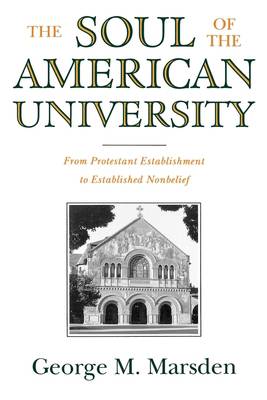
En raison d'une grêve chez bpost, votre commande pourrait être retardée. Vous avez besoin d’un livre rapidement ? Nos magasins vous accueillent à bras ouverts !
- Retrait gratuit dans votre magasin Club
- 7.000.000 titres dans notre catalogue
- Payer en toute sécurité
- Toujours un magasin près de chez vous
En raison de la grêve chez bpost, votre commande pourrait être retardée. Vous avez besoin d’un livre rapidement ? Nos magasins vous accueillent à bras ouverts !
- Retrait gratuit dans votre magasin Club
- 7.000.0000 titres dans notre catalogue
- Payer en toute sécurité
- Toujours un magasin près de chez vous
The Soul of the American University
From Protestant Establishment to Established Nonbelief
George M Marsden
Livre broché | Anglais
98,45 €
+ 196 points
Description
Only a century ago, almost all state universities held compulsory chapel services, and some required Sunday church attendance as well. In fact, state-sponsored chapel services were commonplace until the World War II era, and as late as the 1950s, it was not unusual for leading schools to refer to themselves as "Christian" institutions. Today, the once pervasive influence of religion in the intellectual and cultural life of America's preeminent colleges and universities has all but vanished. In The Soul of the American University, Marsden explores how, and why, these dramatic changes occurred.
Far from a lament for a lost golden age when mainline Protestants ruled American education, The Soul of the American University offers a penetrating critique of that era, surveying the role of Protestantism in higher education from the founding of Harvard in the 1630s through the collapse of the WASP establishment in the 1960s. Marsden tells the stories of many of our pace-setting universities at defining moments in their histories, including Harvard, Yale, Princeton, the University of Michigan, Johns Hopkins, the University of California at Berkeley, and the University of Chicago. He recreates the religious feuds that accompanied Yale's transition from a flagship evangelical college to a university, and the dramatic debate over the place of religion in higher education between Harvard's President Charles Eliot and Princeton's President James McCosh. Marsden's analysis ranges from debates over Darwinism and higher critics of the Bible, to the roles of government and wealthy contributors, the impact of changing student mores, and even the religious functions of college football. He argues persuasively that the values of "liberalism" and "tolerance" that the establishment championed and used to marginalize Christian fundamentalism and Roman Catholicism eventually and perhaps inevitably led to its own disappearance from the educational milieu, as nonsectarian came to mean exclusively secular.
While the largely voluntary disestablishment of religion may appear in many respects commendable, Marsden believes that it has nonetheless led to the infringement of the free exercise of religion in most of academic life. In effect, nonbelief has been established as the only valid academic perspective. In a provocative final chapter, Marsden spells out his own prescription for change, arguing that just as the academy has made room for feminist and multicultural perspectives, so should there be room once again for traditional religious viewpoints. A thoughtful blend of historical narrative and searching analysis, The Soul of the American University exemplifies what it advocates: that religious perspectives can provide a legitimate contribution to the highest level of scholarship.
Far from a lament for a lost golden age when mainline Protestants ruled American education, The Soul of the American University offers a penetrating critique of that era, surveying the role of Protestantism in higher education from the founding of Harvard in the 1630s through the collapse of the WASP establishment in the 1960s. Marsden tells the stories of many of our pace-setting universities at defining moments in their histories, including Harvard, Yale, Princeton, the University of Michigan, Johns Hopkins, the University of California at Berkeley, and the University of Chicago. He recreates the religious feuds that accompanied Yale's transition from a flagship evangelical college to a university, and the dramatic debate over the place of religion in higher education between Harvard's President Charles Eliot and Princeton's President James McCosh. Marsden's analysis ranges from debates over Darwinism and higher critics of the Bible, to the roles of government and wealthy contributors, the impact of changing student mores, and even the religious functions of college football. He argues persuasively that the values of "liberalism" and "tolerance" that the establishment championed and used to marginalize Christian fundamentalism and Roman Catholicism eventually and perhaps inevitably led to its own disappearance from the educational milieu, as nonsectarian came to mean exclusively secular.
While the largely voluntary disestablishment of religion may appear in many respects commendable, Marsden believes that it has nonetheless led to the infringement of the free exercise of religion in most of academic life. In effect, nonbelief has been established as the only valid academic perspective. In a provocative final chapter, Marsden spells out his own prescription for change, arguing that just as the academy has made room for feminist and multicultural perspectives, so should there be room once again for traditional religious viewpoints. A thoughtful blend of historical narrative and searching analysis, The Soul of the American University exemplifies what it advocates: that religious perspectives can provide a legitimate contribution to the highest level of scholarship.
Spécifications
Parties prenantes
- Auteur(s) :
- Editeur:
Contenu
- Nombre de pages :
- 480
- Langue:
- Anglais
Caractéristiques
- EAN:
- 9780195106503
- Date de parution :
- 02-05-96
- Format:
- Livre broché
- Format numérique:
- Trade paperback (VS)
- Dimensions :
- 154 mm x 230 mm
- Poids :
- 712 g

Les avis
Nous publions uniquement les avis qui respectent les conditions requises. Consultez nos conditions pour les avis.






